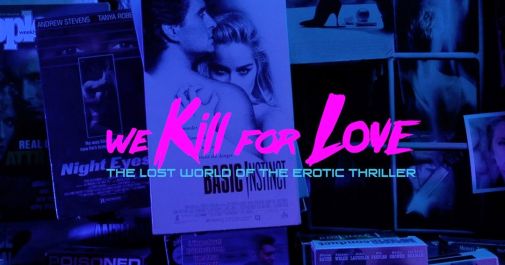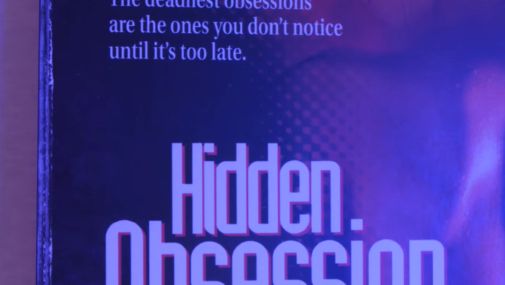Doc Corner: 'We Kill For Love: The Lost World of the Erotic Thriller'
 Sunday, September 10, 2023 at 9:00PM
Sunday, September 10, 2023 at 9:00PM 
If you’re restless for the return of Karina Longworth’s You Must Remember This podcast, "Erotic ‘90s", then We Kill For Love: The Lost World of the Erotic Thriller may be for you. In many ways, Anthony Petra’s near three-hour video essay (even so much as to get the opening credit of “A video by”) is like the direct-to-video cousin to Longworth’s long-form audio series. And I don’t mean that as a pejorative. I hope the director wouldn't take it that way, either, given Petra’s desire to focus more attentively on the less fondly remembered, less glossy works of (largely independent) Hollywood eroticism that more often than not skipped theatrical exhibition. Instead they instead found money and eager viewers on the shelves of video stores and as late-night cable network fare across the country...
We Kill for Love doesn’t dive quite as deep as You Must Remember This. It’s pulling from far fewer elements to tell its story of a sexual movement. Nor does it have the time to really focus in on some of its more interesting areas, keen as it is to move through erotic thriller’s entire history from its beginnings in pulp novels, film-noir, its meteoric rise in the 1980s on through to the cash-strapped and meagre returns of the 2000s.
But it does also have its charms, the likes of which Longworth and her tales of secret and/or forgotten histories of Hollywood’s first century couldn’t possibly be able to reproduce. We’re dealing with video here, after all, and the erotic thriller boom of the ‘80s and ‘90s that both products seek to deconstruct was very much a visual product. If you’re watching this, you’re likely well aware of the stylistic tropes that typically fill these movies—and Penta, working here as his own editor, manages to build fun montage sequences out of them. There’s the blue moonlight and neon-lit modern-contemporary architecture, probably in Los Angeles or somewhere with long coastlines alongside which to drive your open-top red convertible. There’s the saxophone and the synthesizers on the soundtrack, somewhere between Kenny G, Kraftwerk and Enigma (as I type, I am listening to a random playlist I found on Spotify labelled “Erotic Thriller Night” that does exactly as you would hope it does). In one of the film’s most entertaining moments, Penta shows how producers basically just played madlibs to invent their seemingly endless supply of fatal/dangerous/criminal obsessions/passions/desires. It's a lot of fun that way.

We get plenty of the more prestigious side of the genre—if prestigious is even a word one could ever use to describe Basic Instinct, Body Double, Fatal Attraction and Body of Evidence. But don’t watch We Kill For Love with the expectation that they are that prominent. Penta is more interested in the microcosm of the even gaudier side of this genre. As the film tries to tell us, there should be little shame in that.
In some of its more interesting passages, Penta and his interview subjects make valid claims that these direct-to-video versions of Hollywood erotica have more worth as feminist art than Basic Instinct ever could. Because of this, it’s sometimes frustrating that the movie gets in its own way. Most notably with an unnecessary framing device featuring Michael Reed. It’s also very easy to tell when the narration is reciting historic academic texts and when it’s reading out Penta’s own over-written prose (spoken by Penta in the sort of low-growl so prominent in these sort of movies).
Ultimately though, it’s hard to really fight against We Kill For Love. Even in its third hour once it begins wading into the murky terrain of the genre’s late ‘90s descent into Playboy-affiliated softcore and the quality of its featured productions grow increasingly unpleasant, there’s still something salient to be found. Although it probably could have been shorter, there is perhaps a very deliberate reason than Penta’s film is only five-minutes shorter than maybe the most famous of this sort of essayistic documentaries, Thom Andersen’s Los Angeles Plays Itself. Like that title, or 2021's Woodlands Dark and Days Bewitched: A History of Folk Horror, it ultimately works to craft something artful out of the pieces of other art. Whether you personally believe erotic thrillers deserve to be put on such a prominent display not just once but twice now (particularly so amid repetitive online discourses about sex in film), We Kill for Love works overtime to try and convince the viewer it warrants that attention. I think it gets there.
Release: To rent via VOD.
Award chances: Even if it was the sort of documentary that awards bodies go for, the subject matter would likely stop them.




Reader Comments (1)
I gotta see this as I grew up on 90s erotic cinema as there were a lot of gems in the world of softcore cinema as it was one of the good things to watch films late at night. It's not the same anymore as some of the films cable would have late at night don't have compelling stories and the sex scenes go on for way too long.